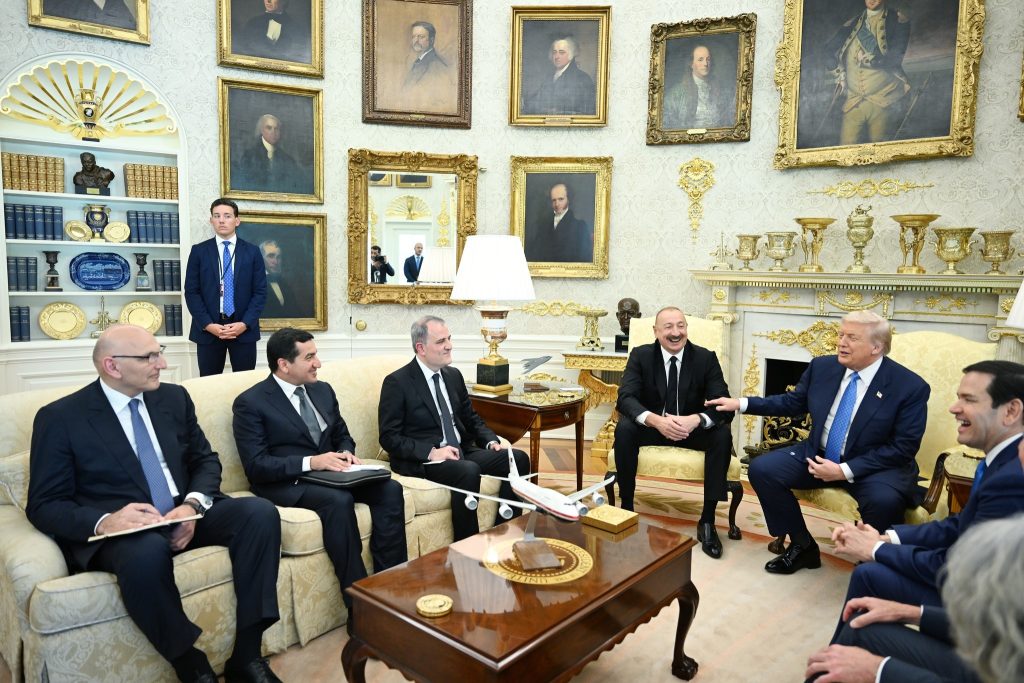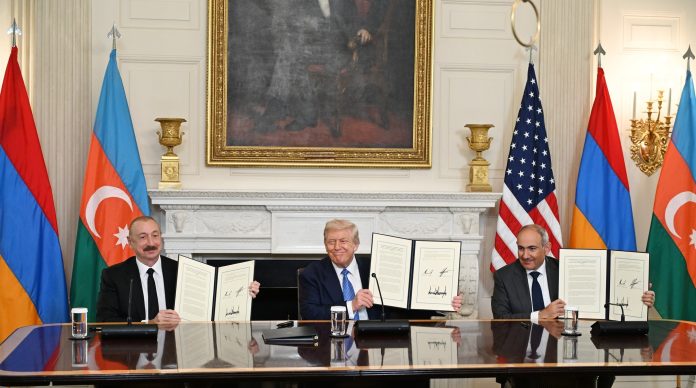Ansar Mahmood Bhatti
In what many are calling a historic turning point for the South Caucasus, Azerbaijan and Armenia have signed a landmark peace agreement, facilitated by US President Donald Trump, officially bringing an end to over three decades of conflict. The ceremony showcased stark contrasts in the demeanor and delivery of the two leaders — with Azerbaijan’s President Ilham Aliyev drawing particular praise for his confidence, openness, and statesmanlike composure.
For 35 years, Azerbaijan and Armenia have been locked in a bitter dispute, marked by periodic escalations, devastating wars, and the loss of thousands of lives on both sides. Generations have grown up knowing little other than hostility and mistrust. Yet, as the pens met the paper, there was a sense — albeit tentative — that a new chapter was opening.
Observers could not help but note the body language of both leaders. President Ilham Aliyev appeared calm, relaxed, and confident — radiating an air of assurance that the agreement would hold. His speech, delivered extempore without notes, reflected a tone of sincerity and directness. Speaking from the heart, he emphasized the need to “turn the page of history” and work together for a future of stability and shared prosperity.
In a symbolic gesture, Aliyev openly extended his hand in friendship to Armenia, signaling a willingness to move beyond decades of hostility. The Azerbaijani leader’s words carried both a sense of closure and a forward-looking vision, making it clear that this was more than a strategic move — it was, in his view, a moral obligation to the people of both nations.
By contrast, Armenian Prime Minister read from a prepared text, his delivery careful and deliberate. While the speech acknowledged the importance of peace and the sacrifices of the past, its measured tone and cautious phrasing conveyed lingering skepticism. Some analysts interpreted this as a reflection of internal political pressures back home, where the peace deal may face scrutiny from factions wary of compromise.

In a surprising moment of levity and candor, Aliyev suggested that both Azerbaijan and Armenia should submit a joint plea to the Nobel Peace Committee to award the Nobel Peace Prize to U.S. President Donald Trump. The comment drew a mix of smiles and raised eyebrows in the audience, but it underscored Aliyev’s willingness to break from the strictly formal script often seen at such events. Whether in jest or sincerity, the remark reinforced his image as a leader unafraid to speak plainly.
Both leaders acknowledged the heavy toll the conflict has taken — countless precious lives lost, communities shattered, and decades of economic potential squandered. For many families, the agreement offers the first real hope of reuniting with loved ones or returning to long-abandoned homes.
Aliyev was unequivocal in his assurance that the peace deal would hold, stressing that the United States was acting as the guarantor. This, he said, should dispel any doubts about the agreement’s longevity. “We have strong international backing for this accord,” he noted, “and we have the will to make it work.”
The peace agreement has been met with widespread approval from the international community. In Islamabad, Prime Minister of Pakistan warmly welcomed the development, calling it “a good step toward lasting stability in the South Caucasus.” Pakistan has long been a close ally of Azerbaijan and has notably refrained from recognizing Armenia — a diplomatic stance rooted in solidarity with Baku.
From the European Union to the United Nations, statements poured in praising the courage of both sides to negotiate and compromise. Many see the deal as a potential model for resolving other long-standing regional disputes, provided both nations can follow through with confidence-building measures in the months ahead.
The peace accord is expected to open new economic opportunities for the entire region. Trade routes that were blocked for decades could be revived, attracting foreign investment and boosting infrastructure development. The South Caucasus, situated at the crossroads of Europe and Asia, has long been recognized for its strategic value. Stability could allow it to fulfill its role as a key energy and transport corridor.
Aliyev expressed optimism about this economic potential, noting that cooperation could lift living standards on both sides of the border. “Peace is not only the absence of war,” he said, “it is the creation of conditions where our people can prosper together.”
While the signing of the peace deal marks a dramatic shift, it is only the beginning of a long process of reconciliation. Centuries-old grievances, national narratives, and political opposition could still test the agreement’s resilience. However, the symbolism of Aliyev’s open-handed approach and Armenia’s willingness to come to the table is hard to ignore.
The road ahead will require trust, patience, and political courage. Yet, as both leaders stood side by side — one speaking freely from the heart, the other reading carefully from prepared notes — the world saw two men attempting, in their own ways, to bridge a gulf that once seemed unbridgeable.
If the spirit of the agreement holds, the people of Azerbaijan and Armenia may one day look back on this moment not merely as the day their leaders signed a treaty, but as the day they dared to imagine a shared future.
The writer is senor journalist and newspaper editor.
Email: [email protected]

















